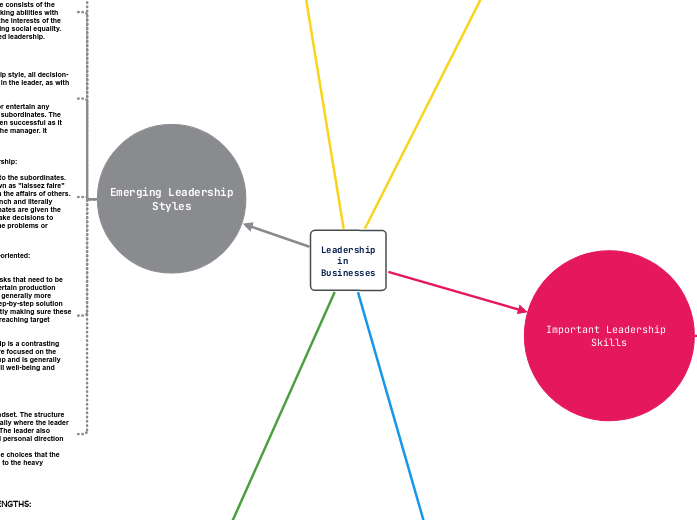Leadership
in
Businesses
Importance of Leadership
Are Leaders Important in a business?
Yes, Leaders are extremely important to business and organisation
Why are Leaders Important to a business
Leaders can help in making decisions
Leaders can be influential in both good and a bad way.
Leaders help other employees feel motivated and loved.
Leaders can increase productivity
Important Leadership
Skills
Assertiveness:
The relationship between assertiveness and leadership emergence is curvilinear; individuals who are either low in assertiveness or very high in assertiveness are less likely to be identified as leaders
Authenticity:
Individuals who are more aware of their personality qualities, including their values and beliefs, and are less biased when processing self-relevant information, are more likely to be accepted as leaders.
Emotional Intelligence:
Individuals with high emotional intelligence have increased ability to understand and relate to people. They have skills in communicating and decoding emotions and they deal with others wisely and effectively.
Such people communicate their ideas in more robust ways, are better able to read the politics of a situation, are less likely to lose control of their emotions, are less likely to be inappropriately angry or critical, and in consequence are more likely to emerge as leaders
Willingness to participate:
This can indicate a person’s interest as well as their willingness to take responsibility for how the group performs. Those who do not say much during a group meeting are less likely to emerge as a leader than those who speak up. There is however some debate over whether the quality of participation in a group matters more than the quantity.
Research has shown the largest contributor to discussion is most likely to be a leader.
HOW DO WE
LEAD?
We lead by learning to follow. Leadership isn't allows about thinking you know everything but is also about understanding and knowing the people you are leading this helps you become a better leader.
Defining Leadership
..........
What is Leadership?
The ability of an individual, group or organization to "lead", influence or guide other individuals, teams, or entire organizations.
..........
What are some qualities of a great leader?
- Great communicator
- Unselfish
- Considerate
- Intelligent
- Open-minded
- Level-headed
- Dependable
- Responsible
- Goal driven
Leaders are important to have in an organisation or business
Emerging Leadership
Styles
THese are some Leadership Styles
Participative or democratic:
The democratic leadership style consists of the leader sharing the decision-making abilities with group members by promoting the interests of the group members and by practicing social equality. This has also been called shared leadership.
Autocratic or authoritarian:
- Under the autocratic leadership style, all decision-making powers are centralized in the leader, as with dictators.
Autocratic leaders do not ask or entertain any suggestions or initiatives from subordinates. The autocratic management has been successful as it provides strong motivation to the manager. It permits quick decision-making
Laissez-faire or free-rein leadership:
Decision-making is passed on to the subordinates. This style of leadership is known as "laissez faire" which means no interference in the affairs of others. (The phrase laissez-faire is French and literally means "let them do"). Subordinates are given the complete right and power to make decisions to establish goals and work out the problems or hurdles
Task-oriented and relationship-oriented:
The leader is focused on the tasks that need to be performed in order to meet a certain production goal. Task-oriented leaders are generally more concerned with producing a step-by-step solution for given problem or goal, strictly making sure these deadlines are met, results and reaching target outcomes.
Relationship-oriented leadership is a contrasting style in which the leader is more focused on the relationships amongst the group and is generally more concerned with the overall well-being and satisfaction of group members
Paternalism Leadership styles:
Often reflect a father-figure mindset. The structure of team is organized hierarchically where the leader is viewed above the followers. The leader also provides both professional and personal direction in the lives of the members.
There is often a limitation on the choices that the members can choose from due to the heavy direction given by the leader.
SWOT Analysis
STRENGTHS:
-Emotionally Intelligent
-Understanding
-Relatable
-Approachable
-HUMBLE
-Calm/Level-headed
WEAKNESSES:
-Can come across as aggressive at times
-Tends to be lazy
-Can be easily distracted at times
-Can be too forgiving at times
-Very critical of self
Threats:
- Some can be that people may seek my weaknesses and use them against me
-At times self-criticism can lead to self-pity, which in the reality of things is "the worst disease"
Opportunities:
-There can be a lot of opportunities that come with these traits such as; Humility
- Humility helps not only the Leader but also the 'follower' learn at all times
- Being Calm helps those that surround you feel like you have everything under control even when you don't {remaining calm is important}
Contact
